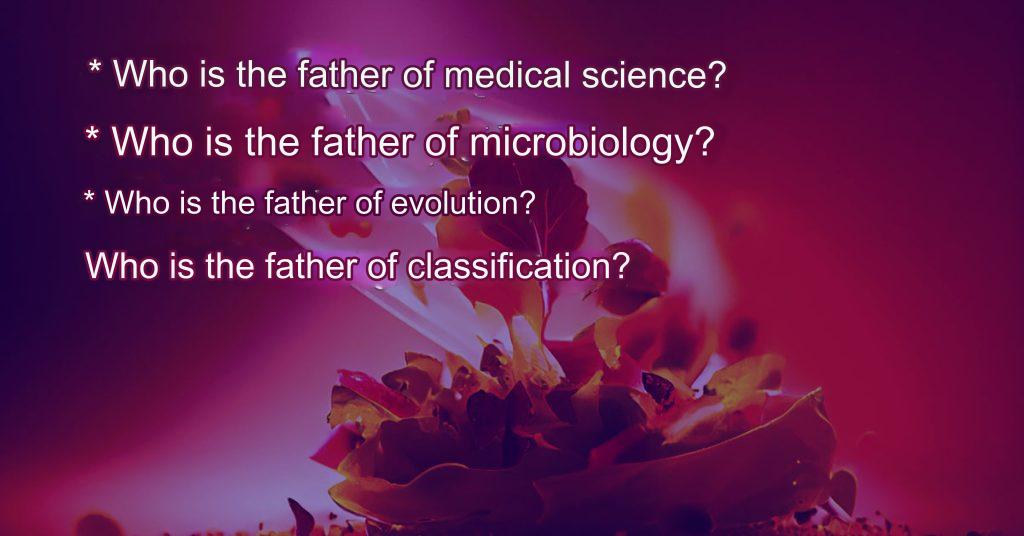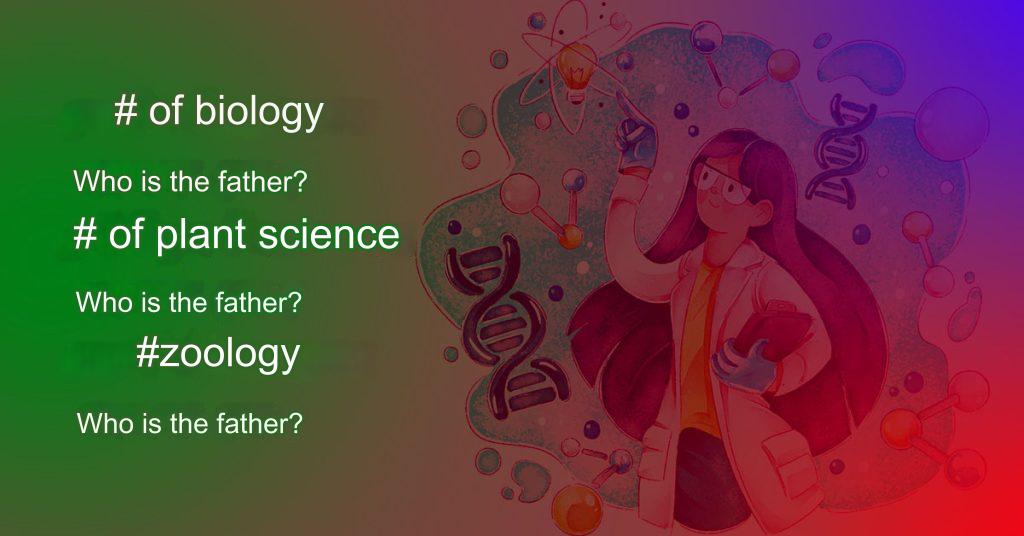Who is the father of biology is a very important question. To survive, everyone needs to know about biology. It is necessary to have proper knowledge about this. Yes friends, today I will discuss about who is the father of biology. Hope this will be useful for everyone.
Who is the father of biology?
The title “Father of Biology”, is given to the ancient Greek philosopher Aristotle. In the field of biology, Aristotle’s contributions laid the foundation for modern understanding of living things and the natural world.
Aristotle lived in the third century BC. He was a student of Plato, British Columbia. Aristotle’s studies in biology were not limited to a single field. He made important contributions to various aspects of biology, including taxonomy, anatomy, physiology and natural history.
Aristotle’s important contribution to biology was the development of a systematic approach to the study of living organisms. It is known for classifying and classifying different species, based on characteristics and behavior, which forms the basis of modern taxonomy. Aristotle’s studies also included detailed observations of animal anatomy and physiology. which provides a deep understanding of the internal structure and functioning of animals.
In biology, one of Aristotle’s most important works is the Historia Animalium. which records his observations on various animals. In this extensive work, Aristotle emphasized the importance of recording experimental observations, which are fundamental to modern scientific research.
Aristotle’s ideas about biology were not always entirely correct by today’s standards. But he, before learning about the natural world, from speculative and mythical methods, represents significant.
Aristotle’s emphasis on systematic observation and classification laid the foundation for the development of modern biology.
Although many other scientists and thinkers have made important contributions to biology over the centuries, Aristotle is remembered for the lasting impact of his work and the development of the field. Because of his innovative efforts to establish it, Aristotle is often called the “Father of Biology”.
Who is the father of modern biology?
The title “father of modern biology” is often given to Charles Darwin. Darwin was an English naturalist and biologist. He is best known for his groundbreaking work on the theory of evolution by natural selection. His book, On the Origin of Species, published in 1859, revolutionized our understanding of the diversity of life on Earth. Darwin’s ideas laid the foundation for modern biology. He had a profound impact on the field, leading Charles Darwin to be recognized as the “Father of Modern Biology”.
Who is the father of botany?
Greek philosopher and scientist Theophrastus is recognized as the “Father of Botany”. He is considered one of the oldest and most influential figures in the field of botany. Theophrastus wrote extensively about plants, describing and classifying various species, growing and using them. His two major works on botany are The Study of Plants and The Causes of Plants. It laid the foundation for the study of plants as a science and earned him the title of Father of Botany.
Who is the father of modern botany?
The title “Father of Modern Botany” is often given to Carl Linnaeus. who was an 18th century Swedish botanist, physician and zoologist. Linnaeus is best known for his binomial nomenclature. It provides standardized methods for naming and classifying plants and animals. The publication of the Species Plantarum and Systema Naturae in various editions in 1753, is one of his achievements. It provides a systematic and widely accepted method for naming and classifying plants. Linnaeus’ contribution laid the foundation for modern plant taxonomy. For this, Carl Linnaeus is recognized as the father of modern botany.
Who is the father of medical science?
The title “father of medical science” is often given to Hippocrates. He was an ancient Greek physician. He is considered one of the most influential figures in the history of medicine. Hippocrates is famous for his contributions to medical knowledge and ethics. Although earlier, there were many important contributors to the development of medical science, Hippocrates is considered by many to be the founding figure of the field.
Who is the father of modern medicine?
The title “father of modern medicine” is often given to Hippocrates. Hippocrates lived in ancient Greece, but his contributions to medical knowledge and ethics laid the foundation for modern medicine. He had a profound and lasting impact on the scientific method, observation and discovery of the natural causes of disease. It is important to note that modern medicine was advanced by many important figures, including Hippocrates, yet Hippocrates is considered by many to be the father of modern medicine.

Who is the father of microbiology?
Anthony von Leeuwenhoek, a 17th-century Dutch scientist, is often considered the father of microbiology. Leeuwenhoek, developed the first practical microscope. He used the microscope for the first time in history to observe and record bacteria and microorganisms. That is why Anthony von Leeuwenhoek is considered a pioneer in the field of microbiology. His groundbreaking research on protoplasm laid the foundation for the study of microbiology as a scientific discipline.
Who is the father of modern biology?
Louis Pasteur is often called the “father of modern microbiology”. He was a French chemist and biologist. Louis Pasteur made many contributions to the pioneering field of microbiology. Pasteur is particularly known for understanding the role of microorganisms in fermentation and for developing the process known as pasteurization. He also helped establish the germ theory of disease. It revolutionized our understanding of disease transmission, and led to advances in disinfection and hygiene practices.
Pasteur’s experiments and discoveries played an important role in the development of modern microbiology. His research has made significant contributions to the advancement of public health and medicine.
Who is the father of zoology?
The Greek philosopher Aristotle is sometimes called the “Father of Zoology.” Aristotle made important contributions to the study and classification of animals. He wrote extensively on nature, particularly the Historia Animalium, in which he classified and described numerous animals. Aristotle’s animal observations and writings laid the foundation for systematic research in animals and biology. This made him a seminal figure in the history of zoology.
Who is the father of modern zoology?
The title “father of modern zoology” is often given to Carl Linnaeus. He was an 18th century Swedish botanist, physician and zoologist. Linnaeus is famous for inventing binomial nomenclature, for scientific nomenclature and classification of living organisms.
His work on species nomenclature and classification laid the foundation for modern taxonomy and systematics. Not only in zoology but also in the wider field of biology, his contributions are many. Linnaeus’ contribution to the classification of species greatly advanced the study of flora and fauna. For this reason, Linnaeus is considered the father of modern zoology and taxonomy.
বিবর্তনের জনক কে
বিবর্তনের জনক চার্লস ডারউইন। প্রাকৃতিক নির্বাচনের মাধ্যমে বিবর্তন তত্ত্বের উপর, তার যুগান্তকারী গবেষণার জন্য চার্লস ডারউইন পরিচিত। ডারউইন 1859 সালে, ল্যান্ডমার্ক বই, অন দ্য অরিজিন অফ স্পিসিজ-এ প্রকাশ করেছিলেন। কীভাবে প্রজাতি সময়ের সাথে বিবর্তিত হয় ও পরিবেশের সাথে খাপ খায়, সে সম্পর্কে ডারউইনের তত্ত্বটি বোঝার বিপ্লব ঘটিয়েছে।
জৈব বিবর্তনের জনক কে
চার্লস ডারউইন জৈবিক বিবর্তনের জনক। প্রাকৃতিক নির্বাচনের মাধ্যমে বিবর্তন তত্ত্বের উপর তার কাজ, বিবর্তনীয় জীববিজ্ঞানের ভিত্তি স্থাপন করে। বিবর্তন প্রক্রিয়ার মাধ্যমে কীভাবে প্রজাতি সময়ের সাথে সাথে পরিবর্তিত হয় এবং অভিযোজিত হয়, সে সম্পর্কে এটি আধুনিক বোঝার ভিত্তি স্থাপন করেছিল।
সামাজিক বিবর্তনের জনক কে
“সামাজিক বিবর্তনের জনক” উপাধিটি প্রায়শই হার্বার্ট স্পেন্সারকে দেওয়া হয়। তিনি ছিলেন 19 শতকের একজন ব্রিটিশ দার্শনিক ও সমাজবিজ্ঞানী। হার্বার্ট স্পেন্সার বিবর্তনীয় তত্ত্ব, বিশেষ করে চার্লস ডারউইনীয় নীতিগুলিকে সামাজিক গবেষণায় প্রয়োগ করেছিলেন। সামাজিক বিবর্তন সম্পর্কে স্পেনসারের ধারণা এবং সামাজিক প্রেক্ষাপটে “সারভাইভাল অফ দ্য ফিটেস্ট” ধারণা প্রাথমিক সমাজতাত্ত্বিক চিন্তার বিকাশকে প্রভাবিত করেছিল।
এটি লক্ষ করা গুরুত্বপূর্ণ যে, সামাজিক বিবর্তনের ধারণা সময়ের সাথে সাথে অনেক বিজ্ঞানী দ্বারা অন্বেষণ ও বিকাশ হয়েছে। স্পেনসার এই ক্ষেত্রে অনেক অবদানকারীদের মধ্যে একজন।
জেনেটিক ইঞ্জিনিয়ারিং এর জনক কে
পল বার্গ, একজন আমেরিকান জৈব রসায়নবিদ এবং আণবিক জীববিজ্ঞানী, প্রায়শই জেনেটিক ইঞ্জিনিয়ারিংয়ের জনক হিসাবে বিবেচিত হয়। 1970-এর দশকের গোড়ার দিকে, পলবার্গ রিকম্বিন্যান্ট ডিএনএ প্রযুক্তির বিকাশ করেছিলেন। যা বিজ্ঞানীদের বিভিন্ন উৎস থেকে ডিএনএ ম্যানিপুলেট ও একত্রিত করাতে সাহায্য করে। এই উদ্ভাবনটি জেনেটিক ইঞ্জিনিয়ারিং ক্ষেত্রের ভিত্তি স্থাপন করেছিল এবং জৈবপ্রযুক্তি ও ওষুধের বিভিন্ন ক্ষেত্রের উপর বড় প্রভাব ফেলেছিল। পল বার্গ, তার যুগান্তকারী গবেষণার জন্য, 1980 সালে রসায়নে নোবেল পুরষ্কার অর্জন করেন এবং জেনেটিক ইঞ্জিনিয়ারিংয়ের বিকাশে গুরুত্বপূর্ণ ব্যক্তি হিসাবে স্বীকৃতি পান।
শ্রেণিবিন্যাসের জনক কে
কার্ল লিনিয়াস, একজন সুইডিশ উদ্ভিদবিদ, চিকিৎসক ও প্রাণিবিজ্ঞানী, অনেকে তাকে শ্রেণীবিন্যাসের জনক বলে মনে করেন। দ্বিপদ নামকরণ পদ্ধতি, যা লিনিয়াস দ্বারা বিকশিত হয়েছিল এবং ব্যাপক স্বীকৃতি এনেছিল। দ্বিপদ নামকরণ পদ্ধতি একটি জীবের জেনাস ও প্রজাতি নির্ধারণের জন্য দুটি ল্যাটিন শব্দ। কার্ল লিনিয়াসের কাজ আধুনিক শ্রেণীবিন্যাস এবং জৈবিক শ্রেণীবিন্যাসের ভিত্তি স্থাপন করেছিল।
উপসংহার
জীববিজ্ঞানের ধারণা টি, প্রাচীন গ্রীক দার্শনিক অ্যারিস্টটলের কাছ থেকে এসেছে বলে মনে করা হয়। যদিও জীববিজ্ঞানের উপর অ্যারিস্টটলের কাজ 2,000 বছরেরও বেশি সময় আগের, তবুও তিনি ক্ষেত্রের উন্নয়নে একটি বড় প্রভাব রেখেছেন। জীবন্ত প্রাণীর অধ্যয়নের জন্য তার পদ্ধতিগত দৃষ্টিভঙ্গি, পরীক্ষামূলক পর্যবেক্ষণ ও প্রজাতির শ্রেণীবিন্যাসের উপর জোর দেওয়া, আধুনিক জীববিজ্ঞানের ভিত্তি স্থাপন করেছিল।
“জীববিজ্ঞানের জনক” শব্দটি একটি ঐতিহাসিক শিরোনাম। অ্যারিস্টটলের সময় থেকে জীববিজ্ঞান ক্ষেত্রটি উল্লেখযোগ্যভাবে বিকশিত হয়েছে। শ্রেণীবিন্যাস, শারীরস্থান, এবং প্রাকৃতিক ইতিহাসের ক্ষেত্রে তার অবদান, পদ্ধতিগত অধ্যয়নের কাঠামো প্রদান করে।
এটি লক্ষ করা গুরুত্বপূর্ণ যে, বহু বিজ্ঞানী ও পণ্ডিতরা বহু শতাব্দী ধরে জীববিজ্ঞানে গুরুত্বপূর্ণ অবদান রেখেছেন। এবং বর্তমান জীববিজ্ঞান অগণিত গবেষকদের সম্মিলিত প্রচেষ্টার ফলাফল। অ্যারিস্টটলের কাজ একটি মৌলিক ভিত্তির প্রতিনিধিত্ব করে ও তিনি “জীববিজ্ঞানের জনক” নামে পরিচিত। কারণ, তিনি নিয়মতান্ত্রিকভাবে শৃঙ্খলার উপর স্থায়ী প্রভাব ফেলেছিলেন।

